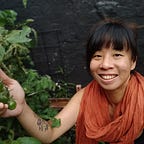What the ‘Makan’ controversy tells us about food-writing as a child of diaspora
In the past week or so, there has been quite a bit of talk in chef and food writers’ circles about the alleged plagiarism involving the cookbook, Makan.
Elizabeth Haigh, owner of MeiMei in the famous Borough market and former UK Masterchef contestant, released the cookbook with much fanfare in May 2021. The book was celebrated by high-profile celebrity cooks, such as Nigella Lawson, whose tweets and website pages endorsing the book seem to have since been taken down. Haigh’s own twitter account has also since been locked down and set to private.
The issue was brought to public attention when New York-based Singaporean writer Sharon Wee released a public statement on social media (6th October 2021), indicating that some content had been lifted from her book — Growing up in a Nonya Kitchen (2012). Wee had brought this to the attention of the publisher, Bloomsbury Absolute, who responded by quietly taking the books off the shelves. No public statement has yet been issued by either Haigh or Bloomsbury Absolute.
Since Wee’s statement was released, several side-by-side text comparisons have been made by Singaporean writer and poet, Daryl Lim, while other Singaporean/Malaysian authors and content creators have also come forward to allege that their work was copied.
You can read more about it here.
Perhaps the most unsettling thing about the plagiarism allegations (and I speak for myself, as both a Nonya and a chef) is not so much the copying of recipes, but rather, it is the lifting of personal anecdotes and stories which had been painstakingly collected and recorded over 10 years by Sharon Wee for her book.
There is a lot to unpack here — intellectual property rights, ethics, representation, how much of a recipe is actually ‘original’ etc. — but what intrigues me the most about this entire scenario: is the uncertain, insecure and often rather untethered position of the diasporic writer and cook.
It is a common trope in ‘ethnic’ food representations in the West, where the diasporic writer acts as somewhat of a food ‘interpreter’ to the general public. As the diasporic cook is seen to have a foot in each boat — the ‘motherland’ and the ‘new’’ homeland — they are viewed as the perfect middlemen to facilitate cross-cultural gastronomic understandings.
Elizabeth Haigh herself is Singaporean-born, but did most of her growing up in the UK. Her mother is Singaporean, and her father, English.
Being part of a diaspora is a double-edged sword because it can also be confusing, especially when growing up. Children of diaspora often feel like they are caught between two worlds, never feeling like they are comfortable (or welcome) in either one. In the words of Ijeoma Umebinyuo:
“So, here you are
too foreign for home
too foreign for here.
Never enough for both.”
(in Questions for Ada)
It is thus almost a rite of passage for every child of diaspora to feel the pull of history at some point in their life — the pull to try and find out more about the past in order to reconcile the two or more worlds that they must inhabit simultaneously. Food is perhaps the most intimate and accessible means by which to do this through. It can be a highly personal and emotional undertaking, especially if it involves combing through memories and interviewing loved (or even estranged) family members.
So, with all this in mind, where then does the authority of the diasporic cook lie?
Despite the intense mixing of cultures and increased rates of migration worldwide, we are still very attached to the idea that culture and tradition are firmly embedded in a physical place. Want an ‘authentic’ recipe for chilli crab? Travel to Singapore to ask the chef or the hawker that has cooked it all their life. Never mind that there is probably a second or third generation cook of Singaporean heritage somewhere in your city that makes an amazing rendition of the dish, the recipe MUST be verified in origin and must have been passed along family lines so that it can be seen as ‘authentic’.
(I have many issues with using the word ‘authenticity’ when it comes to cuisine, but that’s another essay for another day)
It is not enough for a diasporic cook to write from their own experience — it is viewed as tainted, impure. She has to go back to the land of ‘origin’ to gather clout, to gather history and to gather heritage. These are the expectations that are set in place for those from diaspora that write of the exact same food, but on different soil.
Perhaps these are the expectations that drove Elizabeth Haigh to do what she (allegedly) did? To take the anecdotes of another diasporic cook, in an attempt to construct the illusion of ‘authority’ required to give her story and recipes weight.
I can only speculate, as no official statement has been made. I am not excusing these actions, as I do believe that they are indeed unconscionable, if proven to be true.
But I can’t help thinking that maybe it’s time for us to be more open to a new kind of diasporic food writing. A kind of writing that is not wrapped up in a romanticised past that needs to be re-visited; a kind of writing that celebrates, instead of apologises for being in the middle; a kind of writing that allows the diasporic cook to share their food on their own terms rather than be the middleman for the food of their ancestors.
Perhaps it’s time for us to realise that food evolves and changes, just as we do, and not only is it just as good — it might have the potential to be even be better.
